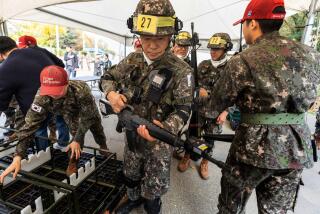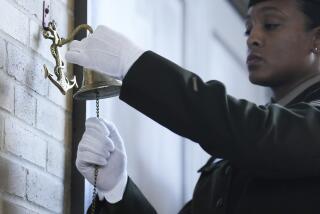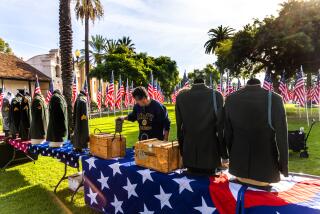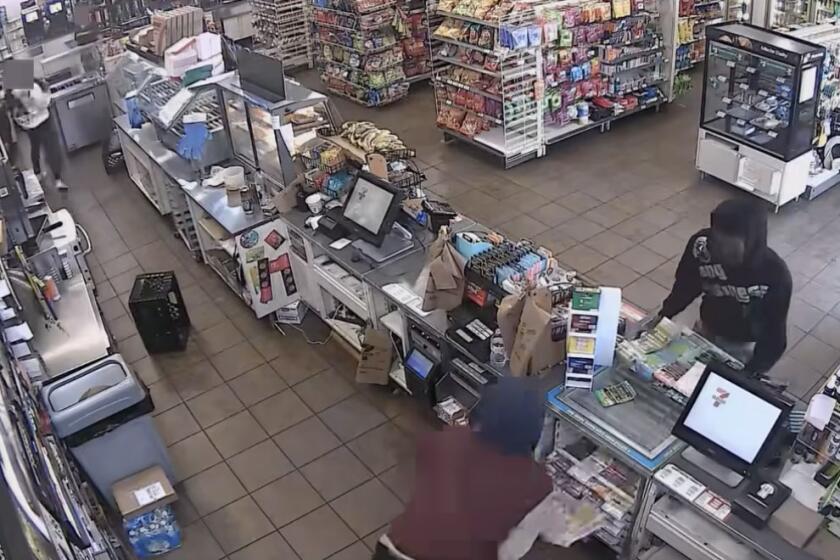Phony Army unit tarnished reputations of reserve associations
The crisp green military uniform made George Liu feel patriotic and proud, and when he marched through the streets of the San Gabriel Valley with the United States Army Volunteer Reserve Association, the green card holder felt like a real citizen.
Liu bought the uniform from a thrift store for $100 and then paid an additional $95 to become a sergeant in the association, a bargain compared with what the group’s web site said it cost to become a colonel or — at the top of the price line — the $335 it cost to be a lieutenant general.
For years, Liu and hundreds of others from heavily Asian neighborhoods in the San Gabriel Valley have joined faux military units, dressing in uniform, marching in parades, rubbing shoulders with politicians and, in at least one instance, traveling abroad as a dignitary.
Like Liu, many of those filling the ranks of the association are Chinese immigrants who had been denied the opportunity to join the army in their homeland, a status symbol there. Members say they view their participation here as being akin to joining a service club, a form of volunteer work with a bit of dress-up thrown in.
“I want to do something good for America. I can’t just pick up a broom and sweep the streets,” said Liu, taking a quick break from the lunchtime rush at the Chinese restaurant where he works as a cook. “I need a group like this. It makes me feel American.”
But the reserve association received unwanted attention this spring when a onetime member was arrested for masquerading as a U.S. military reservist and preying on immigrants by promising that joining his break-away group would give them an inroad to U.S. citizenship.
Yupeng Deng’s group, which he named U.S. Army/Military Special Forces Reserves, did business out of a Temple City strip mall in what looked much like a U.S. Army recruiting office.
There, authorities said, he issued credentials that resembled U.S. military papers and told some recruits that the paperwork could get them out traffic tickets or entitle them to military benefits. He asked recruits to refer to him as “Supreme Commander.”
So hazy were the lines between the real military and Deng’s group that some members even showed up at U.S. recruiting offices to pay their dues, authorities said.
Liu said the fallout from Deng’s arrest, covered breathlessly by the local Chinese languagemedia, sent a chill through his group.
Along with other members, Liu stopped wearing his uniform and felt forced to defend his affiliation to friends. Appearances were canceled. Politicians distanced themselves. Some members quit.
“My wife and son asked me: ‘What are you doing participating in illegal activities at your age?’” said Ko Ping Chen, an 86-year-old member of Liu’s group.
“They were so worried they asked me: ‘Do you want to die in prison?’”
Chen, who served in the U.S. Army Air Forces during World War II, said he was finally able to convince his family that the group he joined — the one that marched in parades and appeared at civic events — was not the same one that authorities were calling “a fake army.”
::
Until Deng got in trouble, the ritual of dressing in military uniforms, pinning on medals and marching in formation seemed as normal and American to many of the new immigrants in the San Gabriel Valley as joining the Boy Scouts.
The idea for the reserve association began with Earnest Tchang, a security guard in Orange County’s Little Saigon who banded together with fellow Vietnamese Chinese who had fought in the Vietnam War. They met socially, dressed in uniform and volunteered as color guards at military funerals. As interest increased among Chinese immigrants, many of them in the San Gabriel Valley, the group became headquartered in Rosemead. In 2006, the United States Army Volunteer Reserve Association was incorporated as a nonprofit.
Membership grew by word of mouth and through recruitment drives outside supermarkets and in neighborhood parks. Before long, their activities came to include organizing cultural events to benefit Chinese orphans adopted by American families and donating turkeys to the elderly on Thanksgivings.
“These seniors are very lonely, they were so glad to see us. We went there wearing our uniforms,” said Sharon King, an insurance agent who emigrated from Taiwan and joined the association. Now a colonel, King said she has recruited at least a dozen others.
Many of those who joined said putting on a uniform was no different than doctors wearing identical lab coats in a medical setting or choir singers in matching colors on stage.
“When we are raising the American flag, it would be disrespectful to be wearing our own clothes,” said Gao Aidi, a Shanghai immigrant who is a major general. “So we wear our uniforms to show respect to the flag. What’s wrong with that?”
As the association grew, some members broke away to form splinter groups. In 2008, Deng split away, setting up in his Temple City storefront and drawing about 100 recruits.
Peng Gao, an Arcadia lawyer who helped Deng incorporate, was so impressed that he joined him.
“I paid more than $200 for the uniform that included a shirt, tie, boots and a nice suit,” said Gao. “It seemed really nice at the time. Then I heard it only cost him about $20 to buy at the army surplus store.”
The group held training sessions on weekends, marching at a local park with wooden guns.
Shortly after the group formed, authorities began investigating Deng. They noticed a pattern of people flashing fake military ID cards at traffic stops, hoping to avoid a ticket. Then in December, an Alhambra taxi driver leaving Los Angeles International Airport was arrested after trying to use his fake ID to get out of a ticket.
Deng was arrested in April and charged with 13 counts of theft by pretense, manufacturing deceptive government documents and counterfeiting a government seal. In a deal with prosecutors in late June, he pleaded guilty and was sentenced to three years in prison.
Los Angeles County Deputy Dist. Atty. Lalit Kundani said what made Deng’s activities illegal was his taking money under false pretenses and promising recruits they would be fast-tracked to U.S. citizenship.
“They did believe they were members of some part of the U.S. military,” said Kundani. “That’s why they went to real U.S. Army recruitment centers to pay their dues and presented their ID cards to the police.”
::
The Deng investigation prompted questions for other groups.
“We always tell our people you cannot use the ID to challenge the authority of the police,” said Jack Qin, a major general in the United States Army Volunteer Reserve Association. “But I have also handed over my membership card, along with my drivers license, when I was stopped by the police. I did it merely to show I am a community volunteer, not a young hooligan.”
Last year, the association itself landed in the spotlight when one member went to China and claimed to be a Chinese American general. As he received red carpet treatment and glowing profiles in the official press, Chinese officials investigated and found no such “general” in the U.S. military. He turned out to be a former martial arts champion who had taught kung fu at a Temple City studio.
“We discourage people from wearing the uniform during non-public functions,” said Qin. “But he is 100% correct in saying he is a general of our association. To me, it’s great he went back to China to show that Chinese Americans can become a general in America.”
But with the rash of bad publicity, San Gabriel Valley politicians who once welcomed the pageantry of having uniformed troops march through their banquets or stand at attention as the national anthem was played distanced themselves. Events were canceled. Association members stopped wearing their uniforms and met more infrequently.
They say their commander is now under pressure to disband the group or at least redesign the uniforms to look more like business attire than military dress.
“Our army is being destroyed by what is happening,” said King. “We didn’t do anything wrong.”
For Liu, losing the group would go far beyond losing a uniform.
As a child, he wanted desperately to join the Chinese army but didn’t have the necessary connections. Big and strong, he was instead sent to the countryside to dig wells and then moved to a paint manufacturing plant.
Once in America, he found work cooking broccoli beef and General Tso’s chicken, dishes that bore little resemblance to the food he knew back home. But he also found a group that allowed him to wear a uniform, the closest he could ever come to being a soldier.
“Please don’t let this group disappear,” Liu said. “We immigrants work very hard to survive in this country. We shouldn’t let one bad fish ruin the whole pot.”
More to Read
Start your day right
Sign up for Essential California for news, features and recommendations from the L.A. Times and beyond in your inbox six days a week.
You may occasionally receive promotional content from the Los Angeles Times.






